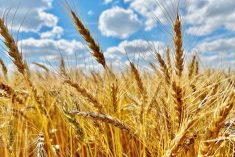PARIS, France (Reuters) — A late blast of winter weather has put further strain on struggling rapeseed and wheat crops in France and the United Kingdom, say analysts and traders.
It could also limit prospects for spring varieties across Western Europe.
The freezing weather is not expected to cause significant frost damage, with European Union crop monitoring unit MARS projecting the bloc will stay free of winterkill losses up to the end of March.
However, it may hamper the recovery of rapeseed and wheat in France and the U.K., which saw poor seeding and growth conditions, most visibly in a rain-soaked Britain.
Read Also

Farmers, traders ‘flying blind’ as U.S. shutdown blocks key crop data
U.S. data vital to global grain and soybean trading has gone dark during the country’s federal government shutdown, leaving commodity traders and farmers without crop production estimates, export sales data and market reports during the peak of the autumn harvest.
Crop damage and delays are causing concern in the market, considering the need to replenish tight grain stocks. Losses to EU wheat may also curb global supply at a time when U.S. wheat is facing a cold snap after a long drought.
Below-average temperatures were forecast to continue across the northern half of Europe this week, including light frosts, but it should be followed by milder conditions next week.
Winter crop abandonment in Britain is expected to far exceed normal levels, with rapeseed most at risk.
“We had an estimate of 20 percent of the drilled (rapeseed) area which was of questionable viability through the winter,” said Susan Twining, an analyst with crop consultants ADAS.
“Of that, I would say about half will ultimately be replaced.”
Less than one percent of the rapeseed area is lost over winter In a normal growing season in Britain, while losses are usually even lower for winter wheat and winter barley.
Twining said five to seven percent of the winter wheat and barley area had been of questionable viability, estimating that half of that would eventually be dug up.
The heavy rain that made 2012 the wettest year on record in Britain had already disrupted the seeding campaign, reducing the winter wheat area by 25 percent.
Concerns are also focused on rapeseed and the size of the lost area in France, which is the EU’s top crop producer,
“It’s too soon to be able to assess the impact of resowings on the final area, but we’ll be below the 1.5 million hectares (3.7 million acres) estimated by the farm ministry in February,” one trader said.
The farm ministry, whose current rapeseed estimate is five percent lower than the area harvested in 2012, is due to update its crop area figures in April.
The recent cold spell, coming after a wet February, has also hampered seeding of spring crops and could force some growers to leave weak rapeseed plants in the field.
“Farmers are no longer sure what to replace their poorer rapeseed with,” said Fabien Lagarde of the oilseed institute Cetiom.
“It’s too late for spring barley and peas. Maize isn’t always suitable and there are some supply snags with sunflower seed.”
Wheat is in better shape than rapeseed but is running behind its usual growth pace because of the mix of wet and cold weather.
Farm agency FranceAgriMer rated two-thirds of soft wheat crops as good or excellent as of March 18, in line with the year-ago level. However, MARS sees winter crops at two weeks behind normal growth pace in the northern half of the country.
In Germany, delays to spring seeding were starting to raise concerns after favourable conditions for winter crops.
“Grain and rapeseed plants have up to now coped satisfactorily with the long continuation of winter weather,” said German farmers’ association DBV.
“During the icy frost periods, plants have been protected by snow, which prevented them drying out.”
Germany is set to harvest 23.5 million tonnes of wheat of all types in 2013, up from 22.3 million tonnes in 2012, and 5.38 million tonnes of rapeseed, up from 4.8 million last year, according to the German Farm Co-operatives Association.
“Spring grain sowings are now around three weeks overdue and have hardly started in much of Germany,” another German analyst said.
“The rule with spring sowings is the later they are drilled the lower the yield, but things can change with favourable summer weather, of course.”
















